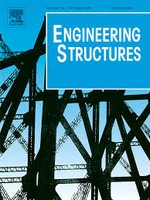Effect of high strain rates on RC bond

This study evaluated bond behavior of lap-spliced reinforced concrete beams subjected to high strain rates. Eleven companion pairs of beams, each consisting of two nominally identical specimens, were designed, built and tested. One beam from each companion pair was tested under static loads generating an average strain rate of 10-5 s-1 , while the other was subjected to high strain rates in the range of 1.0 s-1 generated using a shock tube. Average peak dynamic beam resistance increased by 30% relative to the reference static conditions due to high strain rate effects. Part of this increase was attributed to improvements in the load carrying capacity of the lap splices, which on average experienced a dynamic increase factor (DIF) applied to bond strength of 1.28. Regardless of strain rate, it was found that the bond strength of splices with and without transverse reinforcement increased in proportion to the ratios of the minimum cover depth and the splice length to bar diameter, respectively.


